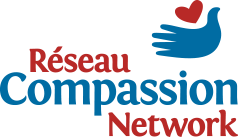From the Heart is a space for the reflections of our staff on issues that matter to them, to our network, and most importantly, to those we walk alongside.
This month, our Director of Strategic Initiatives, Paul Vermette, shares how new socio-economic models, combined with the legacy of our founding Sisters, have led Réseau Compassion Network towards a new way to identify how we can best serve those in need.
In the fall of 2021, I was given the opportunity to help refine the guidelines that underpin how we respond to unmet needs here at Réseau Compassion Network (RCN). Responding to unmet needs in an efficient and productive manner has always been a priority for us; it’s what the Sisters did with such care and what they wanted us to continue to do when they transferred their important works to us.
That said, the needs in the world are virtually limitless. How do we choose the ones we’ll respond to? This question has always weighed on us.
It would be easy if there was a rigid formula to follow, but we all know our world doesn’t follow straight lines. The Sisters don’t respond to unmet needs in that way either.
I’ve always loved listening to Sister Carol Zinn. She once described religious life as a radical response to the messages of the gospel in a particular cultural and historical context. She says that we are called to respond to what world needs today, not what was needed 10, 50 or even 100 years ago. Rigid guidelines, or simply repeating what we’re already doing isn’t going to cut it. We need to go where we’re needed now. This has become a guiding principle for me in my role.
So back to our task at hand: finding a set of guidelines to help us focus on what types of needs we’ll respond to.
I sat down with one of our consultants, Denise Belanger, to pick her brain. She and I have discussed the social determinants of health many times before as a possibility to anchor our work. In terms of research and a modern approach to social change, the determinants are spot-on, but they still felt very broad.
Denise also described a few other social constructs she had come across, and there it was: complex poverty. This theory clearly explains why and how a multitude of needs go unmet in our society, and also guides us towards action and solutions that are aligned with our values of compassionate care, equality for all, and social justice. Understanding complex poverty allows us to use a set of principles that will help create some guideposts for us.
Complex poverty is not just about a lack of money. It speaks to the complexity of people’s lives and the interplay between the many facets of who they are. People’s mental, physical and spiritual health are determined by their personal web of interrelated determinants of health, and much of it is outside of their control.
We tested the concept with the entire RCN team at a gathering in November, 2021, and it sparked many great discussions, new ideas and fresh perspectives. We knew we had found the model we were looking for. We know this will help anchor our future decisions and actions when addressing unmet needs.
In the end, we didn’t discover insulin, or uncover a deep truth about the world that no one else had thought of. The Sisters had figured this out long ago and outlined it in their charisms. We simply found a new way to put words to our values, which in turn, will help put those values into action. The concept of complex poverty gives us some useful secular language to bridge the values that tie us together with the science and research of today.
Fighting for social justice, being present in community, and using the gifts we’ve been given to level the playing field of life: these are the things RCN believes in that resonate strongly with my own moral compass.
Getting to work with people like Denise and be guided by people like Sister Zinn, who share those same values, is what keeps me motivated every day. As we tackle complex poverty together and walk alongside those in need, I continue to be thankful for the part I get to play in this important work.

